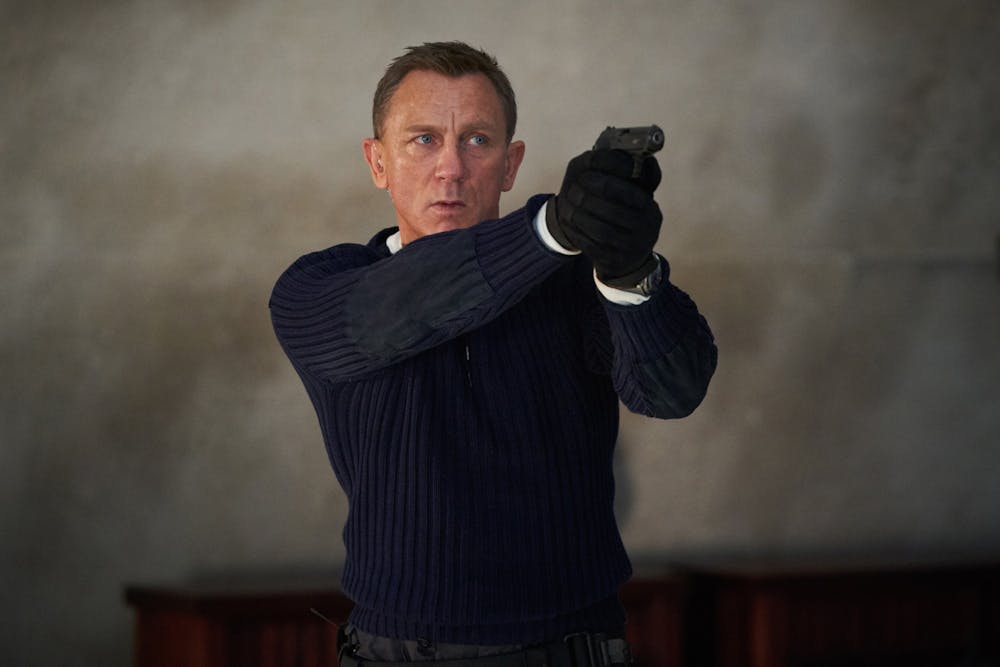Movie: “No Time to Die”
Release Date: Oct. 8, 2021
Director: Cary Joji Fukunaga
Runtime: 2 hours 43 minutes
Genre: Action/Adventure
Columnist's rating: A-
Editor's note: The following review contains spoilers for "No Time to Die" and "Casino Royale"
Over the course of Daniel Craig’s run as 007, his era as Bond has become clearly defined by trust, or the lack thereof.
It started with "Casino Royale," when a franchise that famously lacked sentimentality gave its cold-hearted spy a heart for the first time since 1969’s "On Her Majesty’s Secret Service." Female leads were cast in "Quantum of Solace" and "Skyfall," but Bond’s torment over the betrayal and subsequent death of Eva Green’s Vesper Lynd remained.
Trust between the studio and Craig himself also wavered after the disappointment of "Spectre," which saw the series betray the serious tone of the other Craig films and return to the campy fun of films like "Goldeneye." Craig was vocal about wanting to move on from the 007 franchise but was reluctantly signed on for one last film.
"No Time to Die" might pick up in the story where "Spectre" left off, but it feels like a more natural sequel to the themes set up in his earlier outings. From the movie's start, Bond senses betrayal coming from the woman he has fallen in love with, even visiting Vesper’s grave to try and reconcile that angst.
If "Skyfall" is a film about how Bond is a broken man because of how his country has abused him, "No Time to Die" is a film about how he’s been broken by those he’s closest to.
Unfortunately for him, it’s not possible to dwell on these notions. His job and role in the world necessitates that he moves on; there is always another mission waiting.
This series has taken smart cues from the "Mission Impossible" franchise, where Tom Cruise and Christopher McQuarrie ditched any semblance of domestic life starting with "Ghost Protocol." It’s unsuited to Ethan Hunt's character in those films.
Ironically, it took Bond having a real relationship to manage, and a child to care for, to make him realize this life is never possible. The villain of "No Time to Die," Lyutsifer Safin, played by Rami Malek, uses mind games to break him down before leading him to this revelation.
Every interaction in the film reminds Bond he is replaceable: M (Ralph Fiennes) hires a new 007 agent, Craig goes on a mission with an equally capable young agent played by Ana De Armas and the villain tries to supplant him as a proper father to his child.
The emotional brutality of this can be felt in every facet of the film, especially in the action scenes (the best in the franchise). Director Cary Joji Fukunaga shoots them with a forceful yet elegant style, where every punch and gunshot feels like a burst of energy.
As much fun as the crazy shootouts in "Spectre" might seem on paper, this relatively grounded take on the action is a much better fit for this interpretation of the character.
This interpretation of Bond finally gets a proper sendoff, cashing in on the continuity the writers chose to set up over Craig’s run of films. He is the first and only portrayal of the character to get a true beginning, middle and end to Bond’s story.
"Casino Royale" saw Bond learn to love and trust, only for reality to strip it away immediately.
"No Time to Die" finally rewards him for his suffering. His love interest, Madeleine Swann, played by Léa Seydoux, is fully committed to him and has his child.
He has an out — a life after the mission is done. The climactic scene's cold realization is that his life is impossible to leave behind: The only way for his family to exist is for him to sacrifice himself, and, ultimately, that is the rightful note the film ends on.
It left the audience in my theater in a stunned silence as the credits rolled to Louis Armstrong’s “We Have All the Time in the World,” an ironic choice and a callback to its presence in the Bond film closest in tone to "No Time to Die," the aforementioned "On Her Majesty’s Secret Service."
M, in a fitting yet unceremonious tribute, raises his glass to toast and quotes Jack London: “The proper function of man is to live, not to exist. I shall not waste my days in trying to prolong them. I shall use my time.”
The characters don’t waste much time reminiscing; they immediately go back to work. Similarly, the franchise will move on past Craig. Bond will be recast and start a new run of films, but the impression Craig made as the character will not be forgotten. He used his time.

